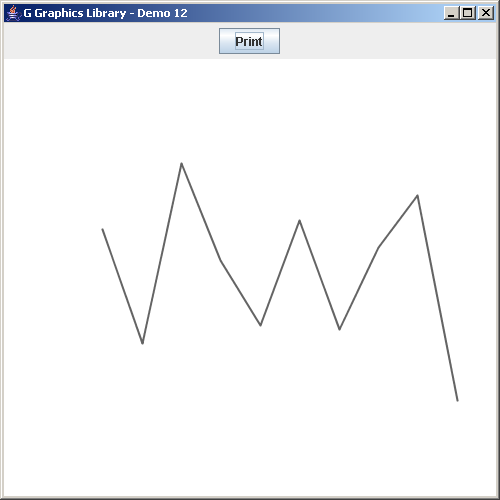Point Annotations

import java.awt.*;
import java.awt.event.*;
import javax.swing.*;
import no.geosoft.cc.graphics.*;
/**
* G demo program. Demonstrates:
*
* <ul>
* <li>Point annotations
* <li>Annotation algorithm
* <li>Annotation background color
* <li>Point images
* <li>Printing feature
* </ul>
*
* @author <a href="mailto:jacob.dreyer@geosoft.no">Jacob Dreyer</a>
*/
public class Demo12 extends JFrame
implements ActionListener
{
private GWindow window_;
/**
* Class for creating the demo canvas and hande Swing events.
*/
public Demo12()
{
super ("G Graphics Library - Demo 12");
setDefaultCloseOperation (JFrame.EXIT_ON_CLOSE);
// Create the GUI
JPanel topLevel = new JPanel();
topLevel.setLayout (new BorderLayout());
getContentPane().add (topLevel);
JPanel buttonPanel = new JPanel();
JButton printButton = new JButton ("Print");
printButton.addActionListener (this);
buttonPanel.add (printButton);
topLevel.add (buttonPanel, BorderLayout.NORTH);
// Create the graphic canvas
window_ = new GWindow (new Color (255, 255, 255));
topLevel.add (window_.getCanvas(), BorderLayout.CENTER);
// Create scene with default viewport and world extent settings
GScene scene = new GScene (window_, "Scene");
double w0[] = {0.0, 0.0, 0.0};
double w1[] = {1.0, 0.0, 0.0};
double w2[] = {0.0, 1.0, 0.0};
scene.setWorldExtent (w0, w1, w2);
TestObject testObject = new TestObject();
scene.add (testObject);
pack();
setSize (new Dimension (500, 500));
setVisible (true);
window_.startInteraction (new ZoomInteraction (scene));
}
public void actionPerformed (ActionEvent event)
{
try {
window_.print();
}
catch (Exception exception) {
System.out.println ("Print failed!");
}
}
/**
* Defines the geometry and presentation for a sample graphic object.
*/
private class TestObject extends GObject
{
private GSegment line_;
private double[] x_, y_;
/**
* As a rule of thumb we create as much of the object during
* construction as possible. Try to do geometry only in the
* draw method.
*/
TestObject()
{
GStyle lineStyle = new GStyle();
lineStyle.setLineWidth (2);
lineStyle.setForegroundColor (new Color (100, 100, 100));
lineStyle.setAntialiased (true);
GStyle symbolStyle = new GStyle();
symbolStyle.setForegroundColor (new Color (0, 0, 255));
GStyle textStyle = new GStyle();
textStyle.setFont (new Font ("Dialog", Font.BOLD, 14));
textStyle.setForegroundColor (new Color (255, 255, 0));
textStyle.setBackgroundColor (new Color (100, 100, 100));
line_ = new GSegment();
line_.setStyle (lineStyle);
addSegment (line_);
GImage symbol = new GImage (GImage.SYMBOL_SQUARE2);
symbol.setStyle (symbolStyle);
line_.setVertexImage (symbol);
int nPoints = 10;
for (int i = 0; i < nPoints; i++) {
GText text = new GText ("Point " + i,
GPosition.NORTH |
GPosition.STATIC);
text.setStyle (textStyle);
line_.addText (text);
}
// Geometry
x_ = new double[nPoints];
y_ = new double[nPoints];
for (int i = 0; i < nPoints; i++) {
x_[i] = 0.2 + 0.8 * i * (1.0 / nPoints);
y_[i] = 0.1 + 0.8 * Math.random();
}
}
public void draw()
{
line_.setGeometry (x_, y_);
}
}
public static void main (String[] args)
{
new Demo12();
}
}
 G-Point-Annotations.zip( 192 k)
G-Point-Annotations.zip( 192 k)Related examples in the same category